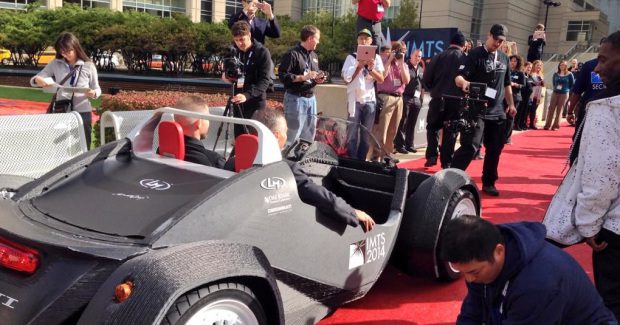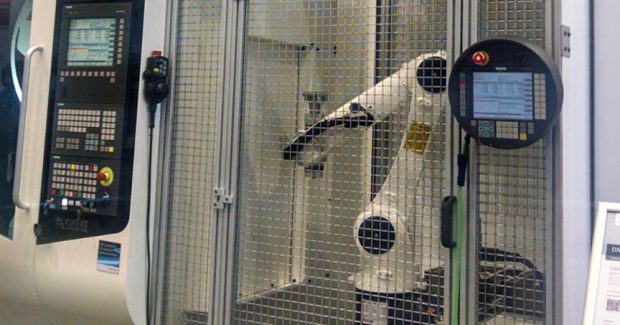3D, Robots, Big Data and a Few Memories
Looking back at IMTS 2014, we all got a peek into the future of additive manufacturing and process chains, plus a few exciting concepts that are going to find their way into the operation of your shop very soon.
Posted: October 9, 2014
Another IMTS in the rear view mirror . . . except the housing for this mirror was made on a 3D printer and displayed on the floor of the show. During the show, all the parts for the Rally Fighter were produced on a large scale 3D printer after being designed by the company’s global community, then assembled by the good folks from Local Motors. The completed car was driven out of the building on the last day of the show. A look into the future? Someday, absolutely.
Between my daytime job and running around to visit with various machine tool builders (who, by the way, reported how they were quite happy overall with the turnout and quality of the leads they got during the show), I managed to see a lot of very exciting concepts, plus a few things that will find their way into the day-to-day operation of your shops and production departments very soon. Let me share just a few of these highlights:
The speed and accuracy of the CNC, motor, drive and encoder combinations were most impressive. I heard a story about one company that retrofitted a huge gantry mill four times and that old iron just keeps getting better, owing to the improvements in speed, resolution and feedback accuracy of the positioning.
Additive 3D manufacturing is currently a hot topic that is now producing top quality prototypes which can be analyzed for manufacturability before the first part is cut. In fact, the collaboration to 3D print and assemble the first-ever electric car onsite stole the show. It was reported that printing began at the start of the show and only took 44 hours to complete. Made of carbon-fiber reinforced polymer, the same plastic as Lego® products, the car was printed on a large-scale additive printer. The wheels and hubcaps were also 3D printed using the direct metal process. The result was an electric car that drives at a top speed of 40 mph and only consists of about 40 parts, versus 20,000 parts in a regular car.
Get your shop ready, because as the development of powdered metals and metal/resin composite matrices advances at light speed, the day is not far off when at least short production runs will be possible using this technology.
The controls side of the machine tool industry might end up as a CNC or PLC world — it’s just too early to tell right now, but we’re watching. When asked about the development of motion control for 3D, one very smart automotive engineer commented, “Well, we’ll just write the algorithms backwards!” And here’s the catch: I’m not 100 percent sure he was kidding.
Hybrid machines were displayed by many builders and, as we’ve discussed before in this column, the open architecture of today’s CNC technology makes it quite possible to run milling, turning, laser, waterjet, grinding and other machining operations in the same work envelope with a single control unit.
The extension of the entire manufacturing process chain throughout the product lifecycle scenario is happening from both ends. More sophisticated CAD/CAM/CNC interfaces are now combining with more of the “big data” management concepts on the back end, factoring all the machine kinematics and production variables into a business model that might be categorized as “predictive maintenance on steroids.” Best of all, the machine tool builders and all of the departments at their end-user customers can benefit from these developments right now.
Even better, these advances are not just limited to the big shops with international operations. I heard of a mid-sized aerospace fastener manufacturer who communicates with his customer and the machine tool builder to monitor and proactively fine-tune his production in real-time, all the time. In other words, you can now literally run the table from design through finished part analysis and machine performance evaluation, all in a streamlined system of data management, with the CNC at the core of the process.
Measurement systems are also evolving to an impressive degree as the capabilities of the newest inspection machines and related technologies continues to ramp up. When the inspection is integrated into the CNC, all of the data being gathered can be accessed by various viewers that are all protected by high-security firewalls.
Speaking of integration, I saw robots running in tandem with machine tools everywhere and, in the most advanced cases, the control was centralized on a single CNC. Portions of a program, whether to run the part or run the robot, were being input on independent channels of the control. No separate robot language required. Very cool.
Two final personal reflections. I was impressed by the number of students and the great questions they asked. Their enthusiasm for manufacturing, whether as machinists, integrators, programmers or mechatronics engineers, was very apparent. One machine tool builder that was asking the kids questions and then testing them at the end of the session was very pleased with their high scores.
Also, I cannot express my sincere appreciation to all of the readers of this column that came up to me throughout the week during the show to visit and just say thanks. I’m still a fan of that old saying, “the rising tide lifts all boats,” because I believe that if we share what we know with the next generation and pass along all of the tribal knowledge we have accumulated over our decades in the industry, we all get better at our jobs – and our industry grows.
Hope to see you all again at the show in 2016.

















